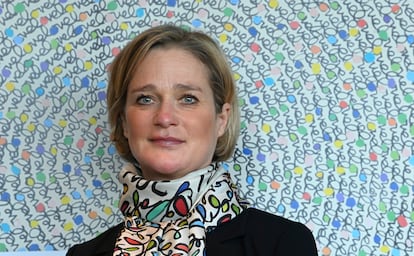Princess Delphine of Belgium, the extramarital daughter of King Albert II, wants equal treatment
The sculptor, who was legally recognized as the Belgian king emeritus’ child in 2020, is unhappy about not being invited to royal family events

On November 20, 2020, sculptor Delphine Böel made her first official appearance as Delphine of Saxe-Coburg, a full member of the Belgian royal house. After years of struggling to be legally recognized as the daughter of King Albert II (who abdicated in 2013), she officially became Princess of Belgium after a DNA test six weeks earlier proved her parentage. “I represent myself — Delphine — just like always. The outside world may see me differently with this title, but I don’t,” she said at that event, which included an official visit to the Saint Pierre Hospital in Brussels. However, three years later, it appears that she does want something more. Böel recently protested to Prime Minister Alexander De Croo, expressing her dissatisfaction with unequal treatment compared to her siblings, Laurent and Astrid, and exclusion from royal family events.
Belgian newspapers reported that Delphine Saxe-Coburg, through her lawyer Marc Uyttendaele, expressed her desire to be invited to all royal events, not just the national holiday on July 21 or tributes to deceased relatives. The letter mentions how she was left out of the King’s Day celebration on November 15 when the rest of the Belgian royal family gathered for a religious service at the Cathedral of Saint Michael and Saint Gudula in Brussels. This was followed by an event at the National Palace and an exhibition.
Böel’s lawyer confirmed on December 9 that the letter was initially sent to King Philippe, Albert II’s oldest son and Delphine’s half-brother. However, it was later redirected to the Belgian government due to a question of constitutional authority. Uyttendaele clarified that Böel had no desire to “cause controversy” and didn’t want the letter to be leaked. However, he said his client faced an “untenable” situation, torn between staying silent or revealing the truth and potentially damaging the monarchy’s image. “In a spirit of goodwill and discretion, she felt the need to address the uncomfortable situation of being treated differently from her sister Astrid and her brother Laurent — the younger siblings of King Philippe.”
According to the Belgian press, the current princess was appropriately treated differently because she does not receive, nor has she ever requested, public funds. However, her lawyer argues that there is “no justification for not being recognized as a full member of the royal family.”
Following a long legal battle, a Belgian court concluded in 2020 that Delphine Böel was the daughter of Albert II and Baroness Sybille de Selys Longchamps. The court’s decision came seven years after Delphine’s initial paternity lawsuit, which stemmed from the 1999 publication of details about Albert II’s extramarital affair in an unauthorized biography of Queen Paola. Albert II initially denied paternity but was later ordered by the court in 2019 to undergo a DNA test or face fines. The paternity test results led to the court’s decision to bestow Delphine with the same privileges as the younger siblings of the reigning monarch, which included the royal surname and the title of “Her Royal Highness.” But now it seems like that’s not quite enough for Princess Delphine of Belgium.
Sign up for our weekly newsletter to get more English-language news coverage from EL PAÍS USA Edition
Tu suscripción se está usando en otro dispositivo
¿Quieres añadir otro usuario a tu suscripción?
Si continúas leyendo en este dispositivo, no se podrá leer en el otro.
FlechaTu suscripción se está usando en otro dispositivo y solo puedes acceder a EL PAÍS desde un dispositivo a la vez.
Si quieres compartir tu cuenta, cambia tu suscripción a la modalidad Premium, así podrás añadir otro usuario. Cada uno accederá con su propia cuenta de email, lo que os permitirá personalizar vuestra experiencia en EL PAÍS.
¿Tienes una suscripción de empresa? Accede aquí para contratar más cuentas.
En el caso de no saber quién está usando tu cuenta, te recomendamos cambiar tu contraseña aquí.
Si decides continuar compartiendo tu cuenta, este mensaje se mostrará en tu dispositivo y en el de la otra persona que está usando tu cuenta de forma indefinida, afectando a tu experiencia de lectura. Puedes consultar aquí los términos y condiciones de la suscripción digital.








































